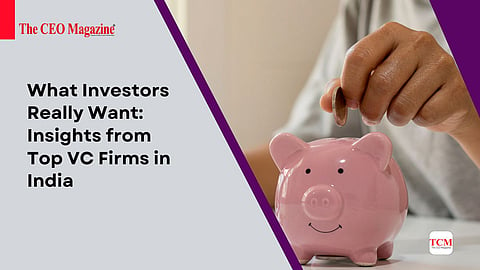
- News
- Women
- Magazine
- IndustryIndustry
- InsightsInsights
- Success Stories
- PublishPublish
- ContactContact
- Media KitMedia Kit

Let me ask you something straight up:
If you had five minutes with India’s top venture capitalists, would you know exactly what to say?
If your answer is "not really" — you’re not alone.
Every week, I speak to founders chasing funding — Series A, seed rounds, bridge rounds — and I keep hearing this:
“We have a solid idea, a great team, decent traction… but the investors still passed.”
Here’s the truth:
Getting VC funding isn’t just about being good. It’s about being fundable — and fundable means understanding what investors really want.
I’ve had the privilege of interacting with partners from some of India’s leading VC firms like Sequoia Capital India, Accel, Elevation Capital, and Blume Ventures. Let me share what I’ve learned — unfiltered, strategic, and straight from the source.
Most founders spend 90% of their time building the product and 10% thinking about how to position the business to investors. That ratio needs to flip when you're raising capital.
“VCs don’t just invest in ideas — they invest in patterns.”
— Managing Partner, Accel India
So, what patterns do they look for?
Yes, investors want to see traction — users, revenue, signups — but what excites them more is velocity:
How fast are you growing?
15–30% month-on-month growth in early-stage B2C startups.
Clear unit economics for B2B businesses.
Consistent growth over at least 6–12 months.
Pro Tip:
Instead of saying “We have 10,000 users,” say:
“We grew from 1,000 to 10,000 in 4 months with zero paid marketing.”
That’s velocity.
Investors back people first, product second.
They ask:
Can this founder raise follow-on rounds?
Can they hire A-players?
Can they inspire confidence under pressure?
“We look for founders who combine storytelling with data.”
— Principal, Elevation Capital
Your personal founder story — what makes you the right person?
A clear, crisp pitch deck (no jargon, just clarity).
The ability to defend your projections confidently.
Remember, your pitch isn’t a monologue — it’s a test of your thinking, communication, and conviction.
One of the first questions any investor will ask is:
How big is your market?
And no, “The Indian market is huge” isn’t enough.
Total Addressable Market (TAM): Should be $500M+ for VC interest.
Bottom-up calculations: Based on user behavior, not just industry reports.
Expansion potential: Can your product evolve into adjacent markets?
Example:
When Zerodha pitched, their market wasn’t just stock trading — it was democratizing investing for the next 100M Indians.
In India’s crowded startup ecosystem, me-too models rarely win.
VCs ask:
What’s your defensible moat?
Is it tech, community, data, distribution, or brand?
Can a well-funded competitor clone you next month?
Patents or proprietary algorithms
High retention or switching costs
Unique partnerships or network effects
“We like startups that become harder to replace the longer they exist.”
— Investment Analyst, Blume Ventures
For a while, blitz-scaling and burning cash were acceptable. Not anymore.
Today’s VC firms in India (especially post-2023) care deeply about:
Customer acquisition cost (CAC)
Customer lifetime value (CLTV)
Payback period
Clear charts on your burn vs growth
When you'll become cash-flow positive
Your path to profitability (even if it's 3 years away)
Want to stand out?
Include a slide titled: “Our Roadmap to Profitability” in your deck.
Here’s a surprising truth:
VCs aren’t betting on perfection — they’re betting on coachability.
“We’ve backed founders who failed before but showed incredible self-awareness.”
— Sequoia India Partner
Ask yourself:
Are you open to feedback?
Do you have mentors or advisors?
Can you pivot fast when data proves you wrong?
Many investors now look at pre-seed founder growth like they track startup metrics.
“We’re bullish on deeptech, fintech, and climate-tech with clear regulatory alignment.”
— Managing Director, Nexus Venture Partners
“Sustainable unit economics is not optional anymore — it’s a deal breaker.”
— Investor, Lightspeed India
“We want founders to show pathways to global expansion, even if early-stage.”
— Partner, Matrix Partners India
Freshworks is a masterclass in fundable DNA.
Girish Mathrubootham understood his global TAM, proved early product-market fit, showed scalable SaaS economics, and built a deep bench of leadership.
From seed funding in Chennai to IPO on NASDAQ — that’s what investors want.
Let me be blunt. Here are a few things that instantly turn off VCs:
Lack of clarity in pitch decks
Overpromising, underexplaining metrics
Incoherent go-to-market strategy
“We have no competition” — red flag
Unprepared cap table or valuation ask
Avoid these at all costs.
Raising capital is not a transaction — it’s a long-term relationship.
Ask yourself:
Does this VC understand our space?
Will they support us when growth slows?
Are they aligned with our values?
Because the best investors do more than write cheques.
They open doors, unlock strategy, and help you become the founder you’re meant to be.
So before you walk into your next investor meeting, take a deep breath and remember:
You’re not just asking for money — you’re offering a chance to be part of something powerful.
Did this article clarify what investors really want?
Share it with your co-founder, pitch deck designer, or startup mentor.
Follow us on Google News
